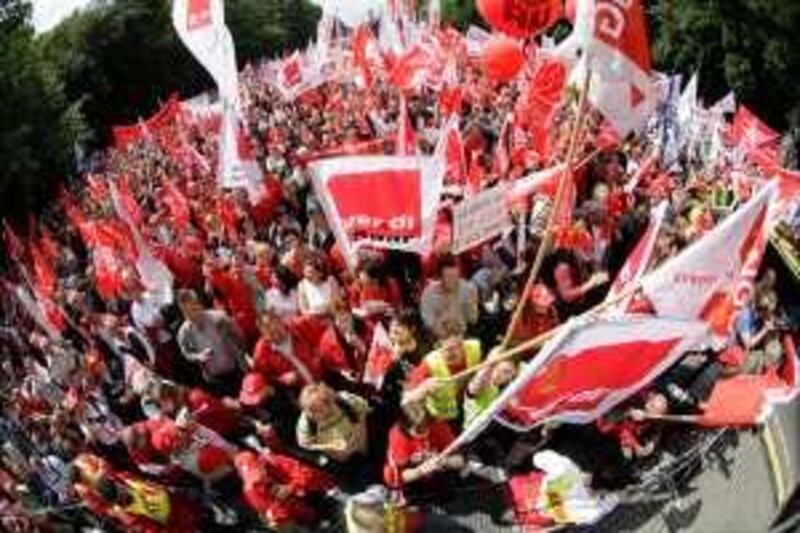Former US president Bill Clinton's election mantra: "It's the economy, stupid", resonates through Germany today as it has not done since the dark days of 1945. The issue dominates the European parliament election, itself no more than a test of public opinion that will read the runes for Chancellor Angela Merkel as she confronts an even bigger test in September's federal elections. Nobody doubts that the central theme in both contests will be the very domestic question of what to do with the once mighty German economy, which has been having a markedly rough ride of late. In the first quarter of this year Germany's gross domestic product tumbled by an unprecedented 3.8 per cent.
A headline on May 16 in The Times newspaper in London calling Germany "the Sick Man of Europe" would have been unthinkable even a few months ago, but after decades that have represented a post-war economic miracle, Germans are now waking up to some unpleasant realities. In Berlin, tens of thousands of workers took to the streets in May demanding government action to protect jobs as the nation faced up to its deepest recession since the Second World War. Among the demonstrators was Franz Müntefering, the chairman of the Social Democrats (SDP) and former vice-chancellor and minister.
"We are here to oppose international financial capitalism," he said. "We must do all we can at the moment to protect jobs." Clearly, the Social Democrats, locked in an uneasy alliance with Mrs Merkel's Christian Democratic Union (CDU), feel it is time to put some distance between themselves and the conservatives, but the polls show it is doing them little good. The latest results show Christian Democrat support unchanged at 36 per cent, the Social Democrats at 24 per cent (down two points) and the Free Democrats, the chancellor's favoured coalition partners, at 14 per cent. The Free Democrats, a pro-business liberal party, could be the big winners at the polls.
So Mrs Merkel was in a buoyant mood when, on May 18, she officially launched the CDU's European election campaign, flanked by Hans-Gert Pöttering, the president of the European parliament. The chancellor pledged her support to back a "strong" EU. It would have been remarkable had she backed anything else: the Franco-German alliance is both the foundation stone of the European Union and the driving force behind greater power for this commonwealth of nations.
Still, the European elections are failing to generate much heat in Germany, especially as all eyes are on the September general election. Jo Leinen, a Social Democratic MP, points to the paradox that "as the European parliament has become more powerful since 1979, voter participation has gone down to the extent there is no proper European election campaign". He says that in Germany the European campaign has become a dry run before the national elections, with all the major parties trying to rally early support that they hope to count on in September.
The anti-capitalist Left Party, led by Oskar Lafontaine, a one-time finance minister in former chancellor Gerhard Schröder's government, has failed to make any impression despite the current economic crisis. Its support, currently running at 10 per cent, is two-thirds what it was last summer. It seems, in fact, that the Greens are slightly ahead of the Left Party in terms of popular support and last month promised to launch a "Green New Deal" touted to create a million jobs by investing in renewable energy.
Der Spiegel, the Berlin-based news magazine, is scathing about what it has seen from the major parties so far. "Despite the economic crisis, Germany's grand coalition parties are conducting their election campaigns as if nothing had happened," it commented recently. "As government debt spirals, politicians are continuing to promise secure pensions and lower taxes. "As is so often the case in the run-up to important elections in Germany, politicians spread good deeds and promises before election day, but wait until after the election to present the citizens with the bill."
dsapsted@thenational.ae






